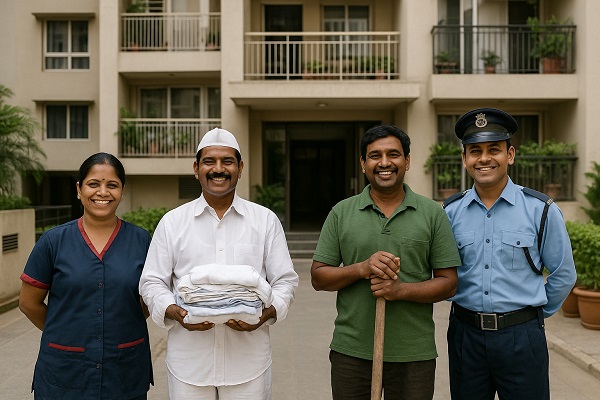.png)
It Takes A City, Not A Couple, To Run An Indian Household
In the great Indian city life, it’s not love or luck that holds a home together—it is the cook, the bai, the driver, the tuition teacher, and a prayer that everyone shows up on time.


Dr. Srinath Sridharan is a Corporate Advisor & Independent Director on Corporate Boards. He is the author of ‘Family and Dhanda’.
June 7, 2025 at 7:38 AM IST
It begins before sunrise, not with yoga or gratitude journaling, but with someone yelling “Geyser on kiya kya?” across the house. Outside, the city is slowly waking up. Inside, the machine has already started. Not the washing machine—that’ll choke later on one of the socks it was never fed—but the intricate, over-scheduled, caffeine-fuelled engine of an urban Indian household.
It takes a village—sorry, scratch that—it takes a whole city to keep an upwardly mobile Indian household running. After all, one needs all the help for their sanity, social life, sex drive, supper to be ready, senility to be balanced with sensibilities, and sanskar to be maintained along the way. Such is the choreography of modern city life. There are no extras in this performance—everyone is cast, cued, and constantly improvising.
This is indeed an enterprise called household. A logistical miracle powered by a full-service human supply chain, emotional bandwidth stretched like old leggings, and the collective hope that everyone shows up today. Because it doesn’t take a couple to run a house anymore. It takes a full city.
First comes the cook. Unofficial COO of the domestic boardroom. She arrives with onions in her bag and stories in her eyes. She wields the knife like a seasoned diplomat—chopping bhindi while negotiating demands for Thai curry and quinoa from members who still think kadhi is too “basic” for weekdays. She has the emotional intelligence of an HR director and the time management of a Mumbai local train. Bonus: she brings updates from other homes, a new biryani recipe, and occasional gossip involving a third cousin’s divorce that somehow impacts your maid’s schedule.
Right behind her is the house help, gliding in with Bluetooth earphones and the confidence of someone who could quit today and get hired tomorrow. She doesn’t clean—she anoints. A single wipe of the cloth and poof, a surface is declared clean enough. By her standards, not yours. Beds are fluffed, dusting is done. Question her work and she’ll remind you, without words, that she has offers. Five of them. All from houses with bigger balconies.
Next up: the driver. Equal parts chauffeur, therapist, and silent witness to your life. He knows traffic shortcuts and also the state of your teenage daughter’s soul. He wears sunglasses that reflect your stress back at you, and nods solemnly through Bluetooth calls not meant for his ears but very much within his control button.
Then comes the tuition teacher. She arrives with a grim expression that your child would worsen, that only your household chai and snacks can solve. Leaves with an apple, a maths worksheet, and an update on your child’s abysmal handwriting. Somewhere in the middle of all this, a handyman floats in, vaguely attempting to fix the ceiling fan that’s been making a “light sound” since Diwali. You’re just grateful he has turned up to fix it .
Then there’s the ironing guy—the magician who turns post-laundry crumples into boardroom-worthy collars. He knows your Monday shirts from your Friday florals. What he presses is indeed your sense of self-respect.
The building watchman deserves his own LinkedIn profile. Gatekeeper by job title, but unofficial concierge, complaint register, moral police, weather forecaster, and when Zomato glitches or Zepto’s “convenience fee” feels like extortion—he becomes your man Friday. Whether it’s carrying up groceries, fixing your DTH signal, or directing a lost dog walker, he knows more about your household patterns than you do.
And then there’s the whole ecosystem that quietly props up your household dignity. The raddiwala who arrives like clockwork, judging your reading habits by the weight of your Sunday supplements. The chemist who home-delivers sensitive items with the discretion of a therapist and never raises an eyebrow at anything risqué—especially those middle-aged health curiosities that arrive with a whispered “aap samajh gaye na?” The car cleaner who mysteriously operates between 4 a.m. and 6 a.m., yet always manages to clean thirty cars without ever being seen. And the all-important carpenter, plumber, and electrician—those miracle men without whom homes would crumble, taps would leak into oblivion, and apartments would truly become apart-tenements.
But this is not just about logistics. It never is. It’s about the silent pressure to have it all together. The fridge must contain both kale and kaju katli. The wardrobe must straddle Zara and zardozi. The bookshelf must have Murakami, a Gita translation, and Goodnight Moon. The kids must discuss Taylor Swift and trigonometry with equal fluency. The grandparents must age gracefully but only on Sundays. And the marriage? It must sparkle on anniversaries and remain functional every Monday after.
It’s not enough to be. One must perform the part of a perfect modern family. The house must smell of lemon-scented floor cleaner and emotional stability. The walls should echo both Vedic chants and Spotify playlists. The children must be raised with sanskar and screen time limits. They should recite shlokas, respect elders, eat kale, and not cry when the iPad timer expires. All while Grandma forwards Bhajans from 1978, warns about the dangers of cold milk, and has opinions about heads of state - of all global nations.
And in the midst of this Shakespearean domestic drama, the main leads—the couple—are barely holding it together. She’s presenting quarterly numbers on Zoom while mouthing “Eat faster!” across the table. He’s toggling between Excel sheets, Swiggy tabs, and the housing society WhatsApp group that’s currently at war over the colour of the lobby paint. Somewhere between dinner and TV drama serials, they might even look at each other with the quiet pride of survivors.
Because despite it all, the house functions. Meals happen. Socks are eventually found. Projects are submitted. The birthday gift is bought just in time. The family photo looks perfect, even if it took six threats, two bribes, and one emergency wipe of ketchup off the youngest’s chin.
So the next time you see a home that seems to be running smoothly, don’t be fooled. Don’t clap for the husband or wife or their apparently well-raised child(ren). Clap for the entire ensemble cast. Clap for the bai and her industrial-strength. Clap for the cook and her millet magic. Clap for the driver who knows when to be invisible. Clap for the Swiggy guy who climbs four floors because the lift is broken. Clap for the grandma who video-calls just to ask if the child had haldi doodh.
Because behind every just-managing Indian family is an army of help. It’s not a village. It’s not a couple. It’s a full-blown city.



